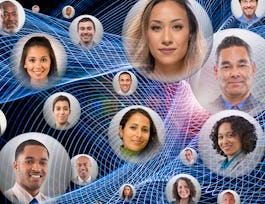This course gives you context and first-hand experience with the two major catalyzers of the computational science revolution: big data and artificial intelligence. With more than 99% of all mediated information in digital format and with 98% of the world population using digital technology, humanity produces an impressive digital footprint. In theory, this provides unprecedented opportunities to understand and shape society. In practice, the only way this information deluge can be processed is through using the same digital technologies that produced it. Data is the fuel, but machine learning it the motor to extract remarkable new knowledge from vasts amounts of data. Since an important part of this data is about ourselves, using algorithms in order to learn more about ourselves naturally leads to ethical questions. Therefore, we cannot finish this course without also talking about research ethics and about some of the old and new lines computational social scientists have to keep in mind. As hands-on labs, you will use IBM Watson’s artificial intelligence to extract the personality of people from their digital text traces, and you will experience the power and limitations of machine learning by teaching two teachable machines from Google yourself.


Big Data, Artificial Intelligence, and Ethics
This course is part of Computational Social Science Specialization
Taught in English
Some content may not be translated

Instructor: Martin Hilbert
32,112 already enrolled
Included with 
Course
(477 reviews)
94%
What you'll learn
Define and discuss big data opportunities and limitations.
Work with IBM Watson and analyze a personality through Natural Language Programming (NLP).
Examine how AI is used through case studies.
Examine and discuss the roles ethics play in AI and big data.
Details to know

Add to your LinkedIn profile
5 quizzes
Course
(477 reviews)
94%
See how employees at top companies are mastering in-demand skills

Build your subject-matter expertise
- Learn new concepts from industry experts
- Gain a foundational understanding of a subject or tool
- Develop job-relevant skills with hands-on projects
- Earn a shareable career certificate


Earn a career certificate
Add this credential to your LinkedIn profile, resume, or CV
Share it on social media and in your performance review

There are 4 modules in this course
In this module, you will be able to define the idea of big data and digital footprint. You will be able to discuss how big data is represented in social science and identify the opportunities of big data.
What's included
10 videos3 readings1 quiz1 discussion prompt
In this module, you will be able to explain the limitations of big data. You will work with an AI interface, IBM Watson, and discover how AI can identify personality through Natural Language Processing. You will analyze the personality of a person.
What's included
8 videos1 reading2 quizzes1 peer review
In this module, you will discover the history of artificial intelligence (AI) and its fields of study. You'll be able to examine how AI is used through case studies. You will be able to discuss the application of AI and you will use AI to create a unique artifact through a hands-on exercise.
What's included
15 videos1 reading1 quiz1 discussion prompt
In this module, you will be able to define the term research ethics. You will be able to examine the role ethics plays in conducting research. You will be able to discuss how ethics is applied when using AI and big data.
What's included
21 videos1 reading1 quiz1 discussion prompt
Instructor

Offered by
Recommended if you're interested in Data Analysis

University of California, Davis

University of California, Davis

University of California, Davis

University of California, Davis
Why people choose Coursera for their career




Learner reviews
Showing 3 of 477
477 reviews
- 5 stars
72.59%
- 4 stars
21.54%
- 3 stars
4.39%
- 2 stars
0.62%
- 1 star
0.83%
New to Data Analysis? Start here.

Open new doors with Coursera Plus
Unlimited access to 7,000+ world-class courses, hands-on projects, and job-ready certificate programs - all included in your subscription
Advance your career with an online degree
Earn a degree from world-class universities - 100% online
Join over 3,400 global companies that choose Coursera for Business
Upskill your employees to excel in the digital economy
Frequently asked questions
These are some of the reflections shared by students who have worked through the content of the Specialization on Computational Social Science:
"Highly enjoyable and most importantly, giving me exceptionally important skills to fulfill my job requirements at a new position in Munich. You may be interested to know the impact of your course on salary and in my case, the knowledge and certification gained adds about another Euro 20.000 on the annual salary (taking it to about Euro 120.000 p.a.)."
"My overall impression of this was: I can't wait to use this for other stuff!!"
"Best course I have taken. I wish more online courses structured like this would be offered."
"The fact that these tools are so easily usable and attainable is incredible in my mind. Not only do we have access to them like we have access to things like Facebook and Twitter, but they're FREE."
"I absolutely think that these tools could be used in my future jobs, or even as a personal reflection. If you scrape and analyze the comments/reactions that your business gets on Youtube, Twitter, Instagram, etc., what does their language use say about how they interact with your brand — or what your brand brings out in them?"
"Wow, this is cool and fun stuff. Even though I may not pursue anything social-science related in the near future, it is still nice to learn and get to experience all of these tools that computational social science offers and benefits in all kinds of careers and fields of study."
"I particularly enjoyed the web-scraping for some reason. It feels very advanced although its very easy. ...It seems to be a very fast and efficient way of grabbing data."
"I enjoyed playing around with machine learning! ...It was also amazing to me how quickly it was able to grasp and learn our input in seconds. It makes me wonder how much more technology will advance in these next few years... It's scary but fascinating."
"The most interesting aspect was the fact that these tools are all free and online. In the past, only researchers at well-funded universities had access to programs like the ones we used in all of our labs. But now, even someone without much technical knowledge on complex software can use these tools."
"I am so surprised that these tools are available to anyone through a simple download, and even more so that they are very user friendly and easy to learn how to navigate. I plan on starting a clothing line company in the future and I think it will be really helpful for me to be able to analyze so much online data."
"As an Environmental Policy Analysis and Planning major, I was fascinated to learn that there is a feasible way to simulate policy implementation and impact multiple times within a short span of time."
"UCCSS has allowed me to feel more confident in my abilities with a computer and to better understand companies like Facebook or Twitter. ...these tools really are powerful but also dangerous. ...It allows powerful individuals to manipulate ideas."
"Throughout the course, the content was challenging, but when it was finally applied to the labs at the end of each module, it was really rewarding to see everything play out. It was even more rewarding when it made sense too! ... I'm really glad I took this course! It was definitely a challenge, but I'm glad I got to experience and learn about so many topics I never knew even existed."
"It was fun seeing the results of the code that I made, and I never thought that I would be doing something like this in my life. The results also showed me what the society would look like.... Social network analysis and web scraping could be the tools that I use in my future job as all the internship that I'm looking now all related to social media or digital media."
"My career aspiration is to be a digital marketing expert. These computational tools have enormous implications for the field."
"I really really loved that this class let me learn hands-on and gave me experience with tools that have real world application and combine STEM & social science. I think that a lot of these tools are useful far beyond homework activities."
"I did my MA in Social Work in India. I am trying to make a come-back in my field after a long career break. I had been hearing Big Data and Data Science everywhere and wondered if there is a link between these and Social Sciences. This specialization gave me needed answers and is helping me to gain very useful skills... Thank you so much for bringing this specialization. You are a very good instructor and made these courses are a smooth sail."
This Specialization on Computational Social Science is the result of a collective effort with contributions from Professors from all 10 campuses of the University of California. It is coordinated by Martin Hilbert, from UC Davis, and counts with lectures from:
1) UC Berkeley: Joshua Blumenstock, Prof. iSchool; Stuart Russell, Professor of Computer Science and Engineering.
2) UC Davis: Martin Hilbert, Prof., Dpt. of Communication & Seth Frey, Prof., Dpt. of Communication & Cynthia Gates, Director of the IRB.
3) UC Irvine: Lisa Pearl, Prof. Cognitive Sciences.
4) UC Los Angeles: PJ Lamberson, Assistant Prof. Communication Studies.
5) UC Merced: Paul Smaldino, Prof. Cognitive and Information Sciences.
6) UC Riverside: Christian Shelton, Prof. Computer Science.
7) UC San Diego: James Fowler, Prof. Global Public Health and Political Science.
8) UC San Francisco: Maria Glymour, Associate Prof. School of Medicine, Social Epidemiology & Biostatistics.
9) UC Santa Barbara: René Weber, Prof. Dpt. of Communication & Media Neuroscience Lab (with Frederic Hopp).
10) UC Santa Cruz: Marilyn Walker, Prof. Computer Science, Director, Computational Media.
Access to lectures and assignments depends on your type of enrollment. If you take a course in audit mode, you will be able to see most course materials for free. To access graded assignments and to earn a Certificate, you will need to purchase the Certificate experience, during or after your audit. If you don't see the audit option:
The course may not offer an audit option. You can try a Free Trial instead, or apply for Financial Aid.
The course may offer 'Full Course, No Certificate' instead. This option lets you see all course materials, submit required assessments, and get a final grade. This also means that you will not be able to purchase a Certificate experience.

